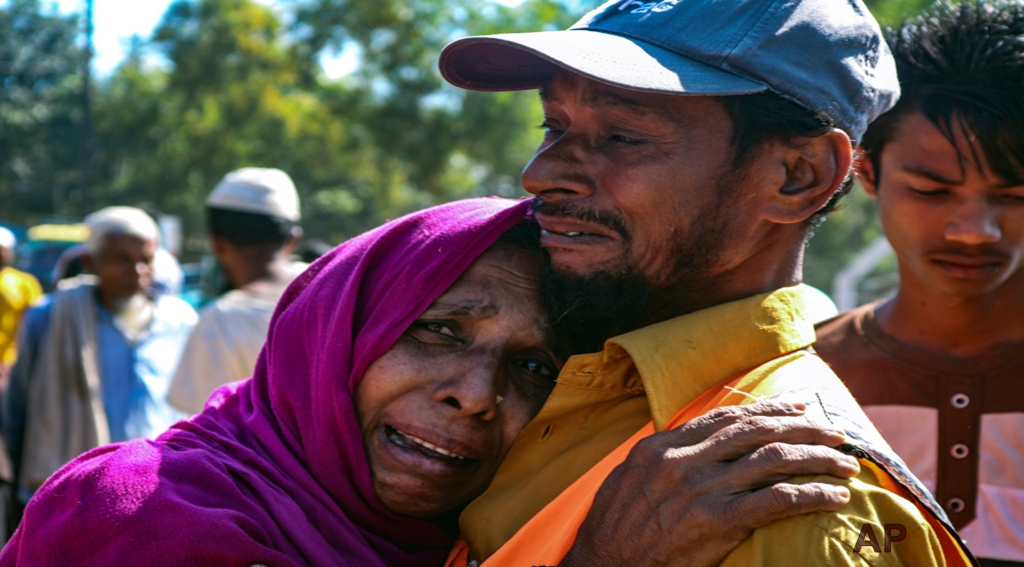
Rohingya coerced into going to remote island, refugees and aid workers say
- 03/12/2020
- 0
By Poppy McPherson, Ruma Paul
(Reuters) – Refugees and humanitarian workers said on Thursday some of the thousands of Rohingya being shipped to a remote island had been coerced, despite government assertions that none would be forced to go.
Two Rohingya told Reuters their names appeared on lists compiled by government-appointed local leaders without their consent, while aid workers said officials used threats and enticements to pressure people into going.
Some refugees named as willing to go to the island were in hiding on Thursday, amid a heavy security presence at the sprawling camps.
Mohammad Shamsud Douza, the deputy Bangladesh government official in charge of refugees, said the relocation was voluntary.
“They are going there happily. No one is forced. The government has taken all measures to deal with disasters, including their comfortable living and livelihood.”
Police escorted the first group of 1,000 refugees in buses from Ukhiya in Cox’s Bazar for the journey to Chittagong port and then on to+– a flood-prone Bay of Bengal island that emerged from the sea 20 years ago.
“They have taken us here forcefully,” a 31-year-old man told Reuters tearfully by phone as he boarded a bus.
“Three days ago, when I heard that my family is on the list, I ran away from the block, but yesterday I was caught and taken here,” he said.
An 18-year-old woman said her husband had put their names on the list thinking it was for food rations. He fled when they were told to go to Bhasan Char, she said, adding that she is also hiding in the camp.
She was among more than 730,000 Rohingya who fled Myanmar in 2017 following a military-led crackdown that the United Nations said was executed with genocidal intent. Myanmar denies genocide and says its forces were targeting Rohingya militants who attacked police posts.
“We came here to save our lives facing different kinds of troubles and difficulties,” she said. “Why would we go to that risky island?”
‘STATE OF PANIC’
Bangladesh says moving refugees who agree to go to the island will ease chronic overcrowding in its camps, which are home to more than 1 million Rohingya, members of a Muslim minority who have fled neighbouring Myanmar.
A Bangladesh naval official said the first 1,500 refugees would on Friday morning leave from the port to cross to the island. The journey takes several hours.
Human Rights Watch said it had interviewed 12 families whose names were on the lists, but had not volunteered to go, while Refugees International said the move was “nothing short of a dangerous mass detention of the Rohingya people in violation of international human rights obligations”.
Two aid workers, who spoke on condition of anonymity, said refugees had come under pressure from government officials who used threats and offers of cash and other enticements to persuade them to go to the island.
A briefing note by a humanitarian organisation, seen by Reuters, said refugees were promised to be given priority to go back to Myanmar when repatriation took place, priority to be resettled in third countries, and access to education.
“We’re deeply concerned about how this is unfolding, particularly in terms of continuity of care for some of our patients,” one of the aid workers said.
The worker cited a case of a refugee with a mental health condition in a “state of panic” after being told he had to move and his concerns over where he would get his medication on the island.
A senior foreign ministry official, who asked not to be named because he was not authorised to speak to the media, said the refugees were being moved because there was little prospect of repatriating them to Myanmar.
The United Nations said in a statement it had been given “limited information” about the relocations and was not involved in preparations.
More than 300 refugees were brought to the island earlier this year after several months at sea in an attempt to flee Bangladesh. Rights groups say they are being held against their will and have complained of human rights violations.
Copyright 2020 Thomson Reuters.






